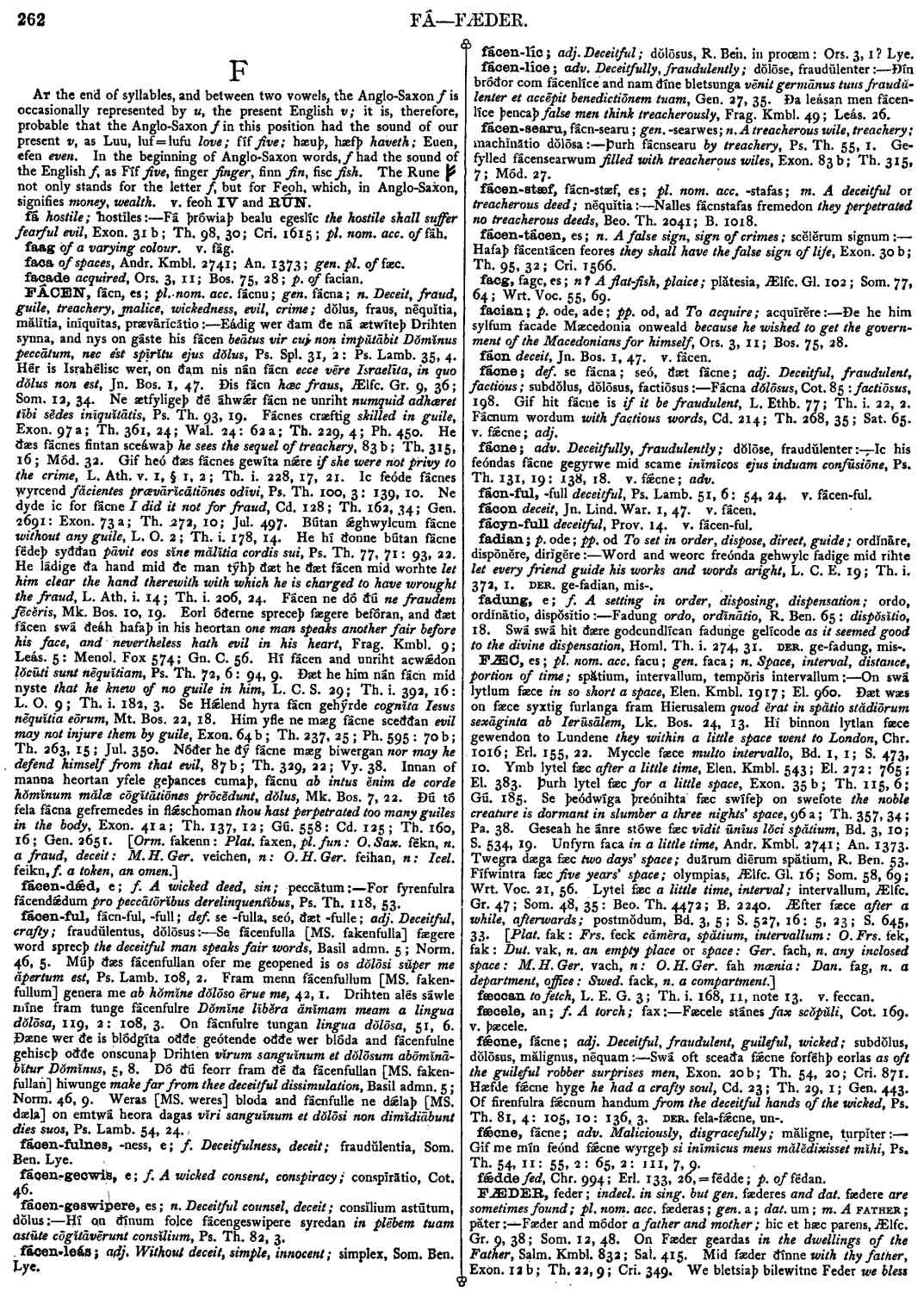FÁCEN
- noun [ neuter ]
-
Eádig wer ðam ðe ná ætwíteþ Drihten synna, and nys on gáste his fácen
beātus vir cui non impŭtābit Dŏmĭnus peccātum, nec est spīrĭtu ejus dŏlus,
- Ps. Spl. 31, 2: Ps. Lamb. 35, 4.
-
Hér is Israhélisc wer, on ðam nis nán fácn
ecce vēre Israelīta, in quo dŏlus non est,
- Jn. Bos. 1, 47.
-
Ðis fácn
hæc fraus,
- Ælfc. Gr. 9, 36;
- Som. 12, 34.
-
Ne ætfyligeþ ðé áhwǽr fácn ne unriht
numquid adhæret tĭbi sēdes inīquĭtātis,
- Ps. Th. 93, 19.
-
Fácnes cræftig
skilled in guile,
- Exon. 97 a ;
- Th. 361, 24;
- Wal. 24: 62 a ;
- Th. 229, 4;
- Ph. 450 .
-
He ðæs fácnes fintan sceáwaþ
he sees the sequel of treachery,
83 b;- Th. 315, 16;
- Mód. 32 .
-
Gif heó ðæs fácnes gewíta nǽre
if she were not privy to the crime,
- L. Ath. v. 1, § 1, 2;
- Th. i. 228, 17, 21.
-
Ic feóde fácnes wyrcend
făcientes prævārĭcātiōnes odīvi,
- Ps. Th. 100, 3: 139, l0.
-
Ne dyde ic for fácne
I did it not for fraud,
- Cd. 128 ;
- Th. 162, 34;
- Gen. 2691: Exon. 73 a ;
- Th. 272, 10;
- Jul. 497 .
-
Bútan ǽghwylcum fácne
without any guile,
- L. O. 2 ;
- Th. i. 178, 14.
-
He hí ðonne bútan fácne fédeþ syððan
pāvit eos sĭne mălĭtia cordis sui,
- Ps. Th. 77, 71: 93. 22 .
-
He ládige ða hand mid ðe man týhþ ðæt he ðæt fácen mid worhte
let him clear the hand therewith with which he is charged to have wrought the fraud,
- L. Ath. i. 14 ;
- Th. i. 206, 24.
-
Fácen ne dó ðú
ne fraudem fēcĕris,
- Mk. Bos. 10, 19.
-
Eorl óðerne spreceþ fægere befóran, and ðæt fácen swá ðeáh hafaþ in his heortan
one man speaks another fair before his face, and nevertheless hath evil in his heart,
- Frag. Kmbl. 9 ;
- Leás. 5: Menol. Fox 574 ;
- Gn. C. 56 .
-
Hí fácen and unriht acwǽdon
lŏcūti sunt nēquĭtiam,
- Ps. Th. 72, 6: 94, 9.
-
Ðæt he him nán fácn mid nyste
that he knew of no guile in him,
- L. C. S. 29 ;
- Th. i. 392, 16: L. O. 9 ;
- Th. i. 182, 3.
-
Se Hǽlend hyra fácn gehýrde
cognĭta Iesus nēquĭtia eōrum,
- Mt. Bos. 22, 18.
-
Him yfle ne mæg fácne sceððan
evil may not injure them by guile,
- Exon. 64 b ;
- Th. 237, 25;
- Ph. 595: 70 b ;
- Th. 263, 15;
- Jul. 350 .
-
Nóðer he ðý fácne mæg biwergan
nor may he defend himself from that evil,
87 b;- Th. 329, 22;
- Vy. 38 .
-
Innan of manna heortan yfele geþances cumaþ, fácnu
ab intus ĕnim de corde hŏmĭnum mălæ cōgĭtātiōnes prōcēdunt, dŏlus,
- Mk. Bos. 7, 22.
-
Ðú tó fela fácna gefremedes in flǽschoman
thou hast perpetrated too many guiles in the body,
- Exon. 41 a ;
- Th. 137, 12;
- Gú. 558: Cd. 125 ;
- Th. 160, 16;
- Gen. 2651 .
Bosworth, Joseph. “FÁCEN.” In An Anglo-Saxon Dictionary Online, edited by Thomas Northcote Toller, Christ Sean, and Ondřej Tichy. Prague: Faculty of Arts, Charles University, 2014. https://bosworthtoller.com/9851.
Checked: 1